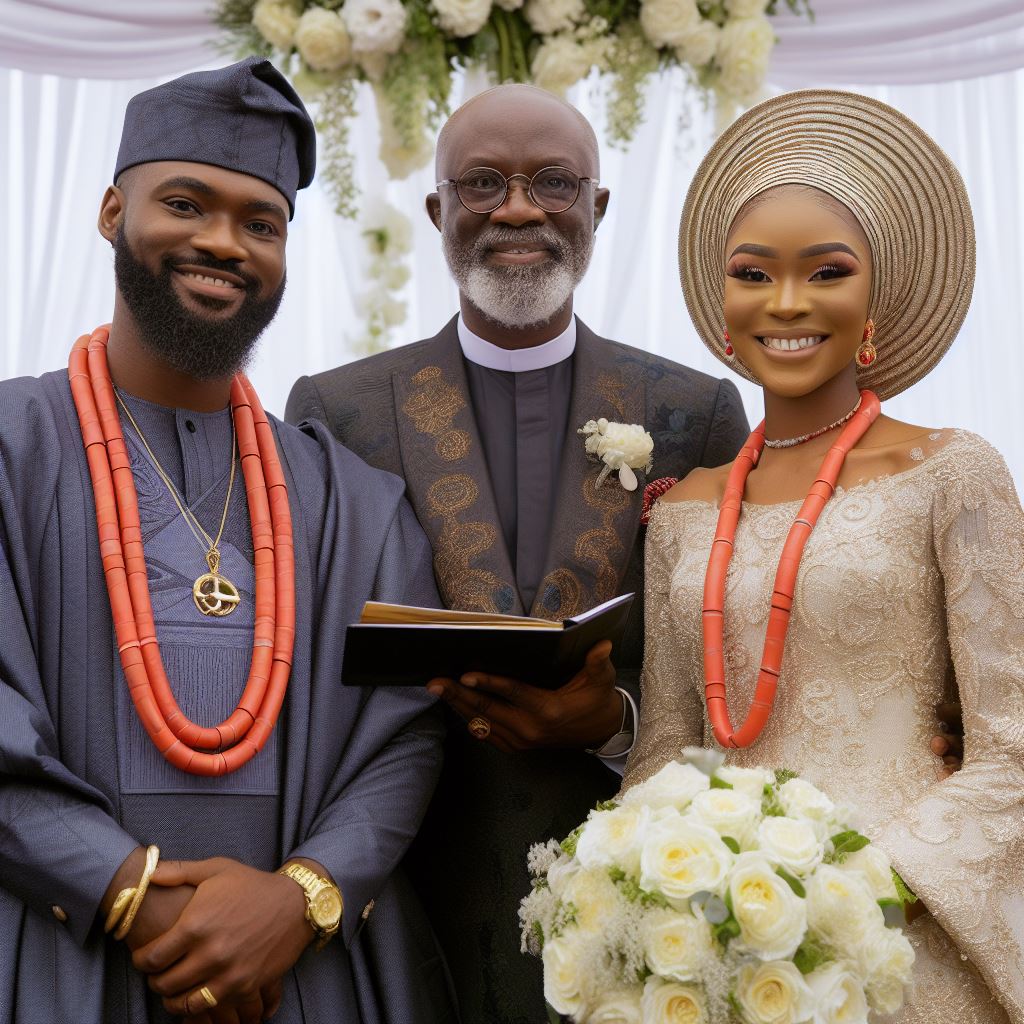Keeping God at the Center: A Nigerian Perspective
Last Updated on January 28, 2024
Introduction
Let’s explore keeping God at the center: A Nigerian perspective.
A. Significance of Keeping God at the Center of Marriage
In Nigerian culture, marriage is deeply sacred, and keeping God at its core is paramount for several reasons:
- Spiritual Foundation: Placing God at the center establishes a strong spiritual foundation for the union.
- Guidance and Wisdom: It provides guidance and wisdom for couples to navigate life’s challenges.
- Unity: It promotes unity, as both partners align their values and beliefs under a common faith.
- Strengthening Relationships: This practice strengthens the marital bond and helps resolve conflicts.
B. Purpose of the Blog Post
This blog post serves to explore the Nigerian perspective on the profound significance of keeping God at the center of marriage.
We will delve into cultural insights, personal experiences, and practical tips for couples looking to enrich their relationships through faith.
Understanding the Nigerian Perspective
In Nigeria, religion holds a significant place in the lives of its people.
Nigerians are known for their strong religious beliefs and practices, with both Christianity and Islam being widely followed.
Religion is deeply rooted in the Nigerian culture and plays a vital role in shaping the values, beliefs, and behaviors of its people.
A. The religious nature of Nigerians
- Nigerians are deeply religious, with a strong sense of faith and spirituality.
- They actively participate in religious activities, such as attending church services or visiting mosques.
- Religious holidays and festivals, such as Easter and Eid al-Fitr, are celebrated with great enthusiasm and reverence.
- Religion provides a sense of belonging and community, fostering solidarity among Nigerians.
- Faith gives individuals hope, comfort, and guidance in navigating the challenges of life.
- Many Nigerians turn to prayer and seek divine intervention in times of crisis or personal difficulties.
B. The importance of spirituality in Nigerian culture
- Spirituality is intricately woven into every aspect of Nigerian culture, influencing social norms and traditions.
- Traditional religious practices, such as ancestor worship or traditional healing, coexist alongside Christianity and Islam.
- Nigeria’s diverse spiritual landscape reflects a deep-rooted respect for cultural heritage and a holistic approach to spirituality.
- Community rituals and ceremonies strengthen communal bonds and evoke a sense of collective identity.
- Religious leaders hold significant influence in the community, providing moral guidance and serving as trusted advisers.
- Respect for elders and traditional customs is closely tied to spiritual beliefs and values in Nigerian society.
C. How religion often plays a crucial role in marriages
- Religion heavily influences the process of selecting a marriage partner in Nigeria.
- Interfaith relationships may face challenges and require compromise and understanding between partners and their families.
- Religious ceremonies, such as church weddings or Islamic Nikkah, are highly valued and considered sacred.
- Marriage is seen as a spiritual covenant, and faith-based principles are central to the success of a union.
- Religious teachings on love, commitment, and forgiveness guide Nigerian couples in their marital journey.
- Couples turn to religious leaders for pre-marital counseling and support in building a strong foundation for their marriage.
In short, the Nigerian perspective emphasizes the profound impact of religion on the lives of Nigerians.
Religion influences their beliefs, behaviors, and relationships, playing a crucial role in their spirituality, culture, and marriages.
Understanding and appreciating the religious nature of Nigerians is essential in bridging cultural gaps and fostering mutual respect and harmony.
God’s Role in Nigerian Marriages
In Nigerian culture, marriage is not just a union between two individuals, but rather a divine institution ordained by God.
It is deeply rooted in religious beliefs and practices, playing a significant role in shaping both the ceremony itself and the foundation of marital success.
A. Emphasizing the belief that God has ordained marriage as a sacred institution
From a Nigerian perspective, marriage is seen as a sacred institution ordained by God Himself.
It is not merely a legal or societal construct, but rather a spiritual bond that requires reverence and commitment.
Nigerians firmly believe that the success of a marriage lies in its alignment with God’s divine plan.
For this reason, Nigerian couples often seek religious guidance and blessings in the early stages of their relationship.
They base their decisions and actions on their faith, viewing marriage as a covenant with God.
This perspective fosters a strong sense of responsibility and commitment within the marriage, as individuals recognize their accountability to a higher power.
B. The role of God as the ultimate foundation of marital success
Nigerians firmly believe that God is the ultimate foundation of marital success.
They believe that a marriage built upon God’s guidance and principles is more likely to thrive and withstand challenges.
As such, the role of God is not just a passive presence in Nigerian marriages; it is an active source of strength, wisdom, and support.
When couples encounter difficulties, they turn to prayer and seek divine intervention.
They believe that God has the power to heal wounds, restore love, and provide guidance during turbulent times.
By relying on God’s teachings and principles, Nigerian couples find solace in the knowledge that they are not alone in their journey.
C. Religious practices and traditions associated with Nigerian marriages
Nigerian marriages are deeply influenced by religious practices and traditions.
Pre-wedding ceremonies often involve blessings from religious leaders and seeking divine protection.
Couples may partake in traditional rites and rituals, which symbolize their commitment to each other and their faith.
During the wedding ceremony, prayers are recited, and biblical readings are shared.
The presence of God is invoked, and the couple exchanges vows before Him.
This religious aspect ensures that God remains a central figure throughout the entire marriage.
Furthermore, Nigerian couples regularly engage in religious practices as a means of maintaining a strong bond with God and each other.
Family prayers, attending religious gatherings, and participating in community service are common activities that reinforce the importance of God’s role within the marriage.
In essence, Nigerian marriages place a strong emphasis on God’s role as the center and foundation of their union.
By recognizing God’s role as the ultimate authority, Nigerian couples believe that their marriage becomes blessed and guided by divine wisdom.
Through religious practices and traditions, they strengthen their bond with God and navigate the challenges of married life with faith and conviction.
Read: Marriage Sermon: Overcoming Temptations as a Couple
Benefits of Keeping God at the Center
A. The source of moral guidance and support from God
- God serves as a moral compass, guiding individuals to make right choices and avoid wrongful actions.
- Believers can find solace in God’s presence, knowing that He provides unwavering support and love.
- Reliance on God’s guidance helps individuals navigate through life’s challenges with wisdom and discernment.
- God’s teachings promote virtues such as honesty, kindness, compassion, and forgiveness, fostering a harmonious society.
B. The belief in divine intervention and its impact on marital challenges
- Keeping God at the center of a marriage allows couples to seek divine intervention in times of difficulty.
- Believers trust in God’s ability to intervene and provide solutions to marital challenges.
- The belief in divine intervention brings comfort and assurance that God is working for the good of the marriage.
- Couples who prioritize God in their relationship are able to handle conflicts with patience, grace, and forgiveness.
C. How keeping God at the center can strengthen the bond between spouses
- Sharing a spiritual connection with God unites spouses on a deeper level of emotional and spiritual intimacy.
- Praying and worshiping together helps couples grow in their faith and strengthens their bond.
- The presence of God in a marriage brings peace, joy, and a sense of purpose.
- When spouses make God the center of their lives, they prioritize their commitment to each other and their relationship.
In general, keeping God at the center of our lives, especially in the context of marriage, brings numerous benefits.
God serves as a source of moral guidance and support, helping individuals make righteous choices and find solace in His presence.
Belief in divine intervention provides reassurance and solutions to marital challenges.
Moreover, when spouses prioritize God, their bond is strengthened through shared spiritual connection and the cultivation of a deeper intimacy.
So, let us strive to keep God at the center of our lives and relationships, experiencing the blessings that come along with it.
Read: Lessons on Love and Respect from Ephesians 5

Practical Ways to Keep God at the Center
A. Encouraging regular communication with God through prayer and worship
- Set aside specific times each day to pray individually and as a family.
- Create a dedicated space for prayer and worship in your home.
- Participate in communal worship by attending religious services regularly.
- Encourage active participation in prayer and worship, rather than just passive observance.
- Make gratitude a regular part of your prayers, thanking God for all His blessings.
- Teach children the importance of prayer and actively involve them in family prayers.
B. The importance of reading and studying religious scriptures together
- Schedule regular family discussions about religious scriptures.
- Read and study religious texts together, exploring their deeper meanings and teachings.
- Encourage individual reading and reflection on religious scriptures.
- Use study guides and commentaries to enhance understanding of the scriptures.
- Discuss how the lessons from the scriptures can be applied in daily life.
- Seek guidance from religious leaders or scholars for deeper understanding of the scriptures.
C. Involve in religious communities and seek spiritual counsel
- Encourage active participation in religious communities, such as church groups or organizations.
- Attend religious events and gatherings regularly to connect with fellow believers.
- Engage in community service and volunteer activities within the religious community.
- Seek spiritual counsel from trusted religious leaders or mentors.
- Consider joining study groups or discussion forums to deepen your understanding of faith.
- Support and encourage each other’s spiritual growth within the religious community.
By following these practical ways, you can keep God at the center of your life and strengthen your faith in Nigeria.
Regular communication with God, through prayer and worship, will deepen your relationship with Him.
Reading and studying religious scriptures together will help you gain deeper insights and guidance.
Active involvement in religious communities will provide a supportive environment for spiritual growth.
Remember to seek spiritual counsel and guidance from trusted individuals.
Together, these practices will help you maintain a strong connection with God and live a purposeful and fulfilling life.
Read: God’s Vision for Marriage: A Deep Dive from Genesis
Overcoming Challenges
A. Acknowledging that challenges may arise in keeping God at the center
Keeping God at the center of your life is a beautiful endeavor, but it’s important to acknowledge that challenges may arise along the way.
Life’s complexities, unexpected events, and worldly influences can sometimes distract us from our spiritual path.
However, it’s crucial to stay committed and remind ourselves of the importance of a strong faith foundation.
Recognize that these challenges are not insurmountable and that with the right mindset and strategies, you can overcome them.
B. Guidance on how to navigate differences in religious beliefs within a marriage
Marriage is a union of two individuals with unique backgrounds, including their religious beliefs. It is natural for conflicts to arise when these beliefs differ.
However, it is essential to approach these differences with love, respect, and open communication.
Engage in heartfelt conversations where both partners listen to each other’s beliefs and concerns.
Seek understanding and find common ground that can foster a harmonious spiritual life together.
Remember, the goal is not to convert one another but to support each other’s faith journeys.
C. Tips for maintaining a strong faith foundation amidst worldly distractions
In today’s busy world, distractions are abundant, making it challenging to keep God at the center.
Nevertheless, with intentional efforts, it is possible to cultivate a strong faith foundation:
- Schedule dedicated time for prayer, meditation, and reflection each day.
- Immerse yourself in religious texts and teachings to deepen your understanding.
- Surround yourself with a community of believers who can uplift and inspire you.
- Engage in acts of service and kindness to strengthen your connection with God.
- Avoid excessive attachment to material possessions and worldly desires.
- Practice forgiveness, both towards others and yourself, as you navigate challenges.
- Stay humble and embrace humility as a cornerstone of your faith.
- Seek solace in nature and appreciate the beauty of God’s creation.
- Regularly remind yourself and your spouse of the importance of keeping God at the center.
By incorporating these practices into your daily life, you can uphold a strong faith foundation and navigate through distractions, keeping God at the center of your marriage and your existence.
Remember, overcoming challenges and navigating through differences in religious beliefs requires a combination of patience, understanding, and genuine love.
With these qualities, you can build a steadfast spiritual bond within your marriage and grow together in faith.
Read: Balancing Personal Goals with Marital Commitments
Explore Further: Combining Tradition & Love: Anniversary Wishes in Pidgin
Testimonials from Nigerian Couples
A. Personal Stories and Quotes
- “Keeping God at the center of our marriage has been our source of strength and unity.” – Ada and Chinedu
- “Through prayer and trust in God, we have overcome numerous challenges in our relationship.” – Ngozi and Emeka
- “God’s guidance has helped us navigate difficult decisions and maintain a loving atmosphere.” – Funke and Tunde
- “We prioritize regular fellowship with other Christian couples to strengthen our faith and marriage.” – Nike and Segun
B. Positive Impact and Overall Satisfaction
- Nigerian couples consistently express immense gratitude for the positive impact of keeping God at the center of their marriages.
- Incorporating spiritual practices into their daily lives has strengthened their bond and enhanced their communication.
- Praying together has become a cornerstone of their relationships, fostering deep emotional and spiritual intimacy.
- Nigerian couples also credit their reliance on God for helping them overcome conflicts and find lasting resolutions.
- By prioritizing shared spiritual values, these couples have developed a stronger sense of purpose and unity.
- Many testify to experiencing a deep sense of peace and contentment when they actively involve God in their marriages.
- Guardianship of their faith has created a solid foundation, providing stability even in turbulent times.
- Nigerian couples find comfort in knowing that they are not alone in their journey, as God’s presence constantly guides and supports them.
In brief, Nigerian couples who have successfully kept God at the center of their marriages share personal stories and quotes affirming the positive impact it has had on their relationships.
By prioritizing prayer, trust, and fellowship, these couples experience greater intimacy, unity, and overall satisfaction.
The foundational belief in God’s guidance empowers them to overcome challenges, find lasting resolutions, and navigate the complexities of life together.
Regardless of the cultural and societal challenges they face, these couples find solace in knowing that with God at the center, their marriages can flourish and thrive.
Conclusion
A. Importance of Keeping God at the Center of Nigerian Marriages
Nigerian marriages thrive when God is at the helm.
Spirituality fosters unity, resilience, and enduring love.
It’s a bedrock for navigating the complex tapestry of Nigerian matrimony.
- Unity: Couples find common ground in faith, fostering a deep, unbreakable bond.
- Resilience: Spiritual couples weather storms with unwavering strength, emerging stronger.
- Enduring Love: God’s love serves as a model for husbands and wives, ensuring love that withstands the test of time.
B. Encouragement to Reflect on Relationships
Readers, consider weaving spirituality into your own marital journey.
It brings:
- Guidance: Divine wisdom illuminates the path ahead.
- Peace: Spiritual harmony reduces conflict and fosters serenity.
- Purpose: A shared spiritual mission enriches your marriage’s purpose.
Incorporate God’s grace, and let it be the compass that guides your Nigerian marital adventure.


